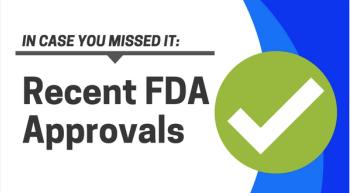
Low-intensity surveillance may be comparable to high-intensity surveillance for cancer control in patients with high-risk non-muscle invasive bladder cancer (NMIBC).

Low-intensity surveillance may be comparable to high-intensity surveillance for cancer control in patients with high-risk non-muscle invasive bladder cancer (NMIBC).

The FDA has approved olaparib (Lynparza) for the treatment of adult patients with deleterious or suspected deleterious germline or somatic homologous recombination repair (HRR) gene-mutated metastatic castration-resistant prostate cancer (mCRPC) who have progressed following prior treatment with enzalutamide (Xtandi) or abiraterone acetate (Zytiga).

The novel coronavirus (COVID-19) pandemic has drastically affected the way that hepatocellular carcinoma (HCC) is treated, making nurse adaptability crucial in recent months.

From the bedside to the boardroom, nurses are leaders, practitioners, scientists, and transferors of knowledge.

The FDA has approved the single-agent atezolizumab as a first-line treatment for patients with metastatic non-small cell lung cancer who have a high PD-L1 expression and no EGFR or ALK genomic tumor aberrations.

While aggressive lymphoma such as mantle cell lymphoma (MCL) typically end in relapse, precision medicine and cellular therapies are improving outcomes for patients, according to Michael Wang, MD.

The cancer mortality rate declined more in states that expanded Medicaid coverage than those that didn’t follow the passage of the Affordable Care Act (ACA) of 2010, a study found.

People who quit smoking at any time, even up to 2 years before a lung cancer diagnosis, have increased chances of survival after their diagnosis, according to data during a 2020 ASCO Virtual Scientific Program press briefing.

The addition of immunotherapy to the triple-negative breast cancer (TNBC) armamentarium has led to a paradigm shift and sparked an abundance of research with immuno-oncology (IO) drugs in new combinations and settings, explained Hope S. Rugo, MD.

The FDA has approved ripretinib (Qinlock) for the fourth-line treatment of patients with advanced gastrointestinal stromal tumor (GIST).

The FDA approved nivolumab (Opdivo) plus ipilimumab (Yervoy) for the frontline treatment of patients with metastatic or recurrent non-small cell lung cancer (NSCLC) with no EGFR or ALK aberrations.

The FDA approved single-agent rucaparib (Rubraca) for the treatment of patients with BRCA1/2-mutant, recurrent, metastatic castrate-resistant prostate cancer.

The FDA approved pomalidomide (Pomalyst) for the treatment of AIDS-related Kaposi sarcoma, that has become resistant to highly active antiretroviral therapy or for patients with Kaposi sarcoma who are HIV-negative.

The COVID-19 Pandemic has increased the use of video conference technology, but this technology has a lasting impact for caregivers in reducing their anxiety when it comes to continuing visits with patients with cancer.

By integrating a comprehensive geriatric assessment with geriatrician-led management care researchers found an improved quality of life for older adults with cancer.

Oncology Nursing News is launching our very own podcast, and we want to hear from you when it comes to the logo and topics to cover.

The introduction of PET scans was a major advancement in the Hodgkin lymphoma treatment paradigm; however, some questions cannot be answered with that test, such as identifying which patients with PET-negative disease will relapse.

The implementation of a multidisciplinary team, which has demonstrated a marked survival advantage compared with single-provider care, is critical in hepatocellular carcinoma (HCC), particularly as it relates to the evolving role of radiation, surgical resection, liver transplantation, and systemic treatment, explained Neehar Parikh, MD.

Nurses and other qualified healthcare providers could see their student loans forgiven if the new bill is passed.

A number of treatment options exist for patients with localized hepatocellular carcinoma, including surgical resection, transplantation, ablation, stereotactic body radiotherapy,, and embolization.

Palliative care providers must, “lean into patient care in creative ways.”

The recent FDA approval of sacituzumab govitecan for certain patients with triple-negative breast cancer was an exciting one. Here’s what oncology nurses need to know.

The FDA approved selpercatinib for the treatment of non-small cell lung cancer, medullary thyroid cancer, and other thyroid cancers with RET alterations.

The FDA has approved the combination of olaparib and bevacizumab for the maintenance treatment of patients with advanced ovarian cancer.

Nurses don’t only save lives – they change them. For National Nurses’ Week, survivors and caregivers shared words of appreciation for their oncology nurses.

The vaccine BVAC-C demonstrated durable antitumor activity in patients with HPV 16– or HPV 18–positive recurrent cervical cancer, according to findings presented at the 2020 AACR Virtual Annual Meeting I.

The FDA granted an accelerated approval to capmatinib for the treatment of adults with metastatic non-small cell lung cancer with a mutation that leads to MET exon 14 skipping (METex14).

Over the last few weeks, the FDA was busy reviewing and approving new cancer treatments.

The FDA has added 3 months to the review period for a biologics license application (BLA) for lisocabtagene maraleucel (liso-cel) for the treatment of adult patients with relapsed/refractory large B-cell lymphoma (LBCL) after at least 2 prior therapies. The extension will allow the agency to review additional data provided by Bristol Myers Squibb, the manufacturer of the anti-CD19 CAR T-cell therapy.

More services will now be covered by the Centers for Medicare & Medicaid Services.